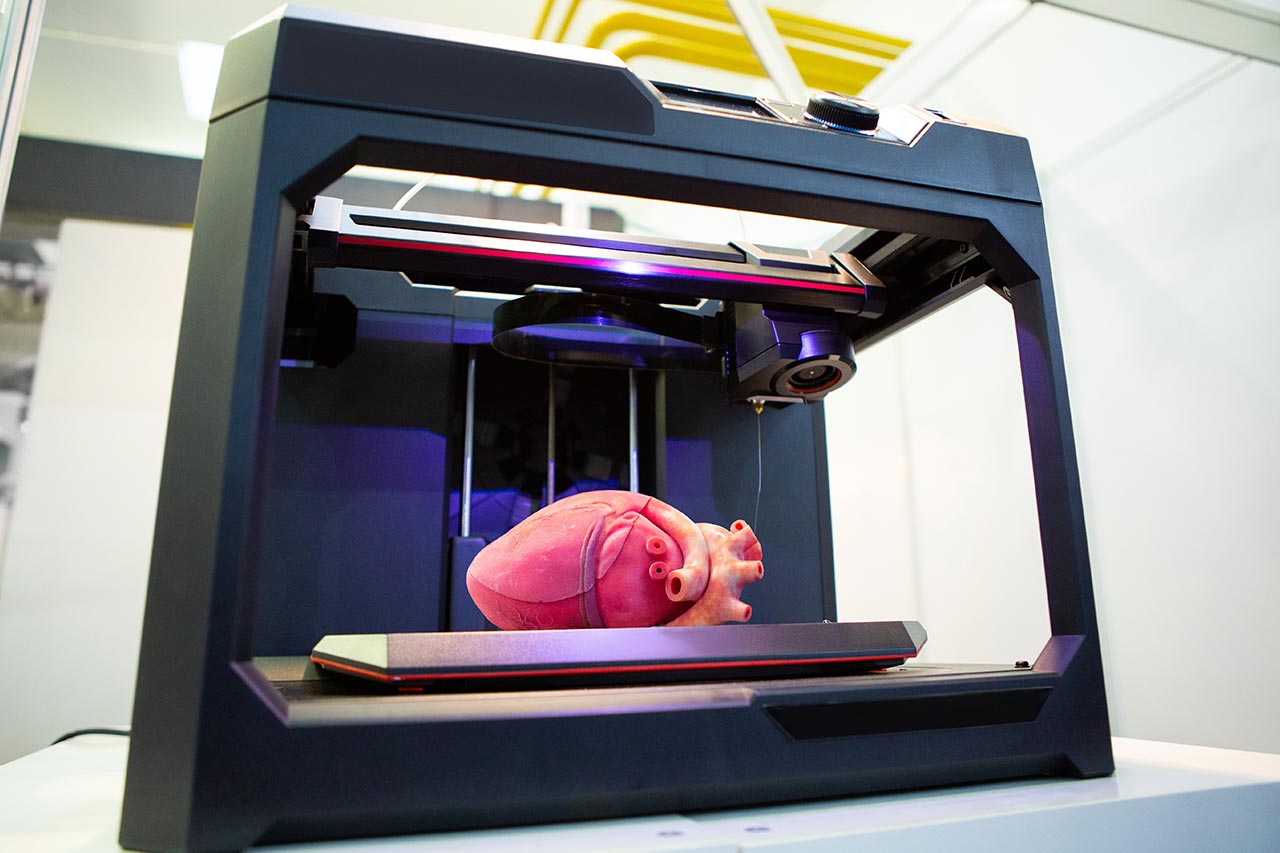3D printing in healthcare: the advance of 3D bioprinted heart

“This is the first time anyone anywhere has successfully engineered and printed an entire heart replete with cells, blood vessels, ventricles and chambers,” said Professor Tal Dvir of Tel Aviv University’s School of Molecular Cell Biology and Biotechnology in April 2019. The 3D bioprinted heart marked a major advance in the treatment of cardiovascular diseases (CVDs). Alcimed has investigated the use of 3D printing technology in healthcare, especially the recent advance of 3D bioprint heart.
The use of 3D printing in healthcare
With the development of 3D printing technology and the growth of precision and personalized medicine, 3D printing has been widely and deeply applied in the medical industry. In earlier years, it was utilized in clinical study devices; gradually, more 3D printed medical devices have been developed, including implants, surgical instruments, wearable devices, dental restorations, and external prosthetics. Recently, 3D printing has been used for the COVID-19 pandemic-related purposes in many countries.
Expectation of the extended use of 3D printing in healthcare
Today, 3D printing has become deeply integrated into the healthcare industry and even has been applied for simple organ transplantation such as bladder. However, there is still an urgent unmet need to expand the use of 3D printing to more vital health care such as cardiovascular diseases. It is the number 1 cause of death globally, which takes an estimated 17.9 million lives each year. Patients with CVDs waiting for transplants are more than donors. For example, in the USA the number of patients on the waiting list is 5 times the number of donors.
Being a major advance in the treatment of CVDs, the 3D bioprinted heart is expected to reduce the shortage of available organs for transplants and to save many lives all around the world. It is estimated that it will take 10 to 15 years to have 3D bioprinted heart used in the transplantation. Fortunately, although this is a new and innovative technology, research has also made great advances in recent years.
Advances of 3D bioprinted heart
New drugs test on 3D-printed human heart tissue
Since the announcement of the scientific breakthrough – 3D printed heart (the size of a rabbit’s) in Prof. Dvir’s lab – the potential of 3D bioprinted heart was explored in a different medical field. In 2020, Bayer AG has signed a collaboration agreement to test out new drugs on human heart tissue 3D-printed by researchers at Tel Aviv University, expecting to “address a new area of early assessment of safety and tolerability of drug candidates.”
Miniature 3D-printed human heart
In the same year, a start-up, BIOLIFE4D emerged in the bioprinting field. BIOLIFE4D bioprinted a miniature human heart by reprograming a patient’s own blood cells (white) to iPS cells and then differentiating those iPS cells into different types of cardiac cells needed to bioprint individual cardia components. BIOLIFE4D was the first company to create a small human heart.
Full-size 3D bioprinted human heart
In 2020, after two years of research, Adam Feinberg and his team from Carnegie Mellon University created the first full-size 3D bioprinted human heart model using their Freeform Reversible Embedding of Suspended Hydrogels (FRESH) technique. Feinberg’s team’s heart is made from a soft, natural polymer called alginate, giving it properties similar to real cardiac tissue.
“The surgeon can manipulate it and have it actually respond like real tissue, so that when they get into the operating site they’ve got an additional layer of realistic practice in that setting”
said Feinberg. It is expected to be a powerful new tool for surgeons to educate patients and plan for real procedures.
Before fully operational 3D-printed hearts are available for patient transplants, many challenges remain. 3D bioprinted hearts still have a long way to go. As innovation and technology in healthcare has always animated us at Alcimed, we are ready to help you develop your uncharted territories about 3D printing in healthcare or to identify the relevant partners for you for tomorrow!
About the authors
Chaoyue, Consultant and Alice, Project Manager at the healthcare Alcimed’s office
Do you have an exploration project?
Our explorers are ready to discuss it with you